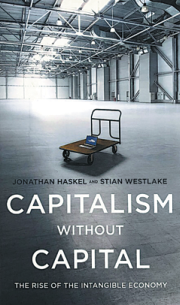The rise of intangibles


Haskel says the real winners in the intangible economy are the managers and the organizational people who put everything together.
"When Steve Jobs passed away, Apple didn't appoint the best software programmer or chip engineer to replace him, but the supply-chain management guy, Tim Cook, who was chief operating officer. People who can bring stuff together and coordinate a little bit are the ones now with the valuable skill sets," he says.
Haskel, who studied economics both at the University of Bristol and the London School of Economics, has spent most of his career in academia.
He has been at the Imperial College Business School since 2008, where he is now both professor of economics and academic director.
He also was an adviser at the Treasury when Gordon Brown was chancellor of the exchequer, and was a member of the reporting panel of the Competition Commission, which looks into competition issues in the UK, for most of the past decade.
Haskel is a particular critic of the euro, which he believes is doomed to fail.
"It is almost entirely political, it seems to me. The lesson from successful currency unions, like the US, for example, is that you not only need a single monetary authority, but you also need a single fiscal authority as well, or some way of having fiscal transfers, between the parties to the union," he says.
"In the US, Connecticut, for example, has been a net payer to Louisiana for decades. In Europe, we have to reach a situation where the Germans also have to be net payers to countries which aren't doing as well. That to me does not seem politically feasible. I don't therefore see any future for the euro."
Haskel also believes there are major risks to recovery 10 years after the global financial crisis.
"The developing countries are looking a little better in the sense that they keep going. The developed countries are clawing their way back. It does, however, seem to me that we haven't got the banking sector sorted out yet," he says.
Haskel says one unknown factor is the impact that artificial intelligence will have on jobs.
"The usual example economists will throw about is automatic teller machines. They will say that they created banking jobs because bank staff could now sell you financial advice and that kind of thing," he says.
"As anybody at MIT and places like that will tell you, the world of artificial intelligence has changed over the past 18 months or so, with advances in image recognition and all these technologies. The idea was that the university lecturer could be helped by AI, but it may be the machine will start giving lectures and indeed writing a book," he says.
As for China, he believes that the rise of the intangible economy could prove to be a boon for the world's second-largest economy.
"China is going from what was a very capital-driven innovation to a more knowledge-driven innovation, and that is another way of saying that intangibles are going to become much more important in driving growth," he says.
Contact the writer at andrewmoody@chinadaily.com.cn




































